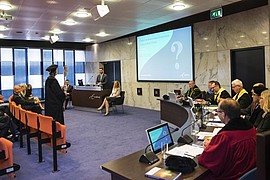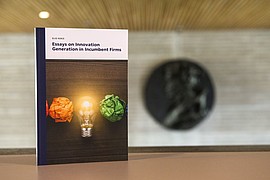PhD Defence: Elio Keko

In his dissertation ‘Essays on Innovation Generation in Incumbent Firms’ ERIM’s Elio Keko aims to enhance our understanding of how incumbent firms organize innovation in response to the challenges and opportunities they face.
Elio defended his dissertation in the Senate Hall at Erasmus University Rotterdam on Thursday, 7 September 2017 at 15:30. His supervisor was Prof. Stefan Stremersch and his co-supervisor was Dr Nuno Camacho. Other members of the Doctoral Committee are Prof. Benedict Dellaert (Erasmus School of Economics), Prof. Patrick Van Kenhove (University of Ghent), Prof. Stefan Wuyts (Koç University), Dr Ivan Guitart (Grenoble School of Management) and Dr Yvonne van Everdingen(Rotterdam School of Management)
About Elio Keko

Elio was born in Tirana (Albania) on December 4th 1988. He obtained his bachelor degree in International Business and Business Economics at Erasmus School of Economics, Erasmus University Rotterdam. He then completed his Master’s degree in Economics and Business, majoring in Marketing, also at the Erasmus School of Economics, Erasmus University Rotterdam and continued with his Ph.D. at the marketing department of Erasmus School of Economics. During his Ph.D. Elio taught Marketing Strategy at the Master’s level for four years, published several case studies with IESE Business School Publishing and a book chapter in the ‘Handbook of Research on New Product Development (edited by Peter Golder and Debanjan Mitra), Edward Elgar, 2017’. In March 2017, Elio joined MTI2 (The Marketing, Technology and Innovation Institute), a consulting firm specializing in innovation and marketing, as an Associate.
Thesis Abstract

This dissertation aims to enhance our understanding of how incumbent firms organize innovation in response to the challenges and opportunities they face. The first paper focuses on understanding all components of the complex innovation ecosystem. In this chapter we synthesize the literature on innovation and provide a critical review of the field. The second paper centres on how firms can succeed in grassroots innovation, thereby harnessing the knowledge and skills of their entire employee base. In this chapter we take an in-depth look at grassroots innovation and its success determinants. The third paper looks at how the inevitable resistance to change affects innovation performance, and how resistance can be turned into a strength. We further explain the relationship between resistance to change and innovation performance by studying the mediating effect of the reaction of concerned employees.
Photos: Chris Gorzeman / Capital Images


